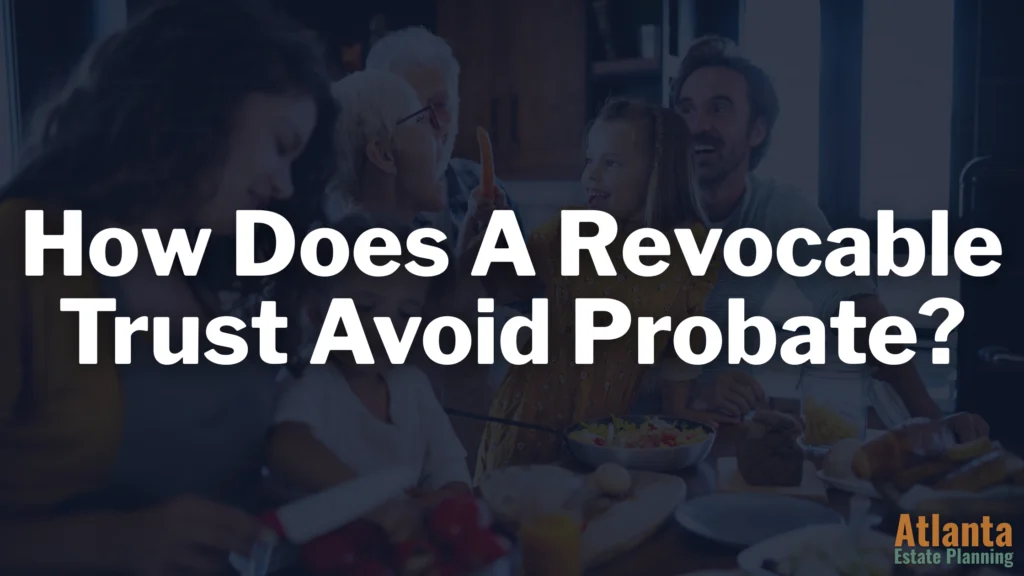How does a revocable trust avoid probate?
By changing who legally owns your property, while you stay in full control.
Imagine your family home and savings tied up in court for a year or more after you pass away.
Lawyers take thousands in fees. Every detail of your finances becomes public.
Your family waits—and worries.
This is what probate can look like in Georgia if the property is still in your name.
A revocable living trust changes that. It’s a legal plan that moves ownership to a private trust while you keep full control.
When you die, your chosen trustee transfers everything quickly and privately, with no probate court.
This guide explains every step in plain language, from setup to final distribution.
Start Here: Watch This Simple Explainer

What a Revocable Living Trust Is and Why It Avoids Probate
A revocable living trust (RLT) is a legal document that owns your property while you stay in charge.
You can buy, sell, refinance, and invest exactly as you do now.
Because the trust owns the property—not you personally—those assets are not part of your probate estate.
That means:
- No court delays
- No public record of your finances
- Lower legal costs for your heirs
In everyday terms, it’s like putting all your property in a safe that only your chosen trustee can open.
When you die, they unlock the safe and distribute everything according to your instructions—without a judge.
Key Roles Inside the Trust
These roles make the trust work:
- Grantor/Settlor – You, the creator of the trust.
- Trustee – You manage assets while alive.
- Successor Trustee – The person you name to manage and distribute after death.
- Beneficiaries – The people who inherit.
- Pour-Over Will – A back-up will that directs any forgotten assets into the trust.
These roles ensure a smooth handoff with no gaps.
How Does a Revocable Trust Avoid Probate Step by Step
During Your Lifetime
- Create and Sign the Trust
An estate attorney drafts and notarizes your trust and pour-over will. - Fund the Trust
- Deed real estate to the trust.
- Retitle bank, brokerage, and savings accounts.
- Assign business interests.
- Sign a general assignment for personal items.
- Live Normally
- Use your Social Security number for taxes.
- Pay bills and mortgages as usual.
- Buy or sell property just as before.
Nothing changes in daily life—only the legal title.
After You Pass Away
The trust becomes irrevocable.
Your successor trustee:
- Gets a tax ID (EIN) for the trust.
- Collects and secures all assets.
- Pays valid debts and final taxes.
- Distributes property to beneficiaries as you directed.
All of this happens privately, often in weeks instead of many months.
Why Full Funding Is Critical to Avoid Probate
A revocable trust only controls the assets placed inside it.
If you forget to retitle an account or deed a property, those items still go through probate.
This is because any assets in your name when you pass away must go through probate.
Our Trust Funding Audit ensures that all of your assets are properly held within the trust.
This way, all the assets avoid probate.
This simple step can save your family 10s of thousands of dollars in probate.
A quick yearly review, especially after buying or selling a property, also helps avoid probate.
Georgia-Specific Rules for Revocable Trusts
Georgia makes trust planning straightforward:
- Trust Law – Governed by O.C.G.A. Title 53, Chapter 12.
- Certification of Trust – Prove the trust exists without showing the full document.
- No State Estate Tax – Only the federal estate tax applies if your estate exceeds $13.61 million (2026).
- Small Estate Affidavit – Estates with no debts can skip probate entirely.
- Transfer-on-Death (TOD) Deeds – Since 2024, you can record a TOD deed to transfer Georgia real estate directly to heirs if you prefer a simpler approach.
A trust can stand alone or work with TOD deeds for extra flexibility.
Cost and Savings Example
For a $500,000 estate in Georgia:
| Scenario | Estimated Cost | Time to Heirs |
|---|---|---|
| Probate (no trust) | Around $34,000 (court, lawyer, executor) | ~9 months |
| Revocable Living Trust | Around $3,300 (legal setup and final admin) | ~1 month |
- Probate – Roughly $34,000 in legal and court fees, with about nine months of delay.
- Revocable Living Trust – Around $3,300 for setup and administration, with assets distributed in about one month.
That’s a savings of over $30,000 and many months of waiting when you avoid probate with a revocable trust.
Calculate how much a revocable trust would cost you.
Other Ways to Avoid Probate—And Their Limits
| Option | Benefits | Risks / Gaps |
|---|---|---|
| Joint Ownership with Right of Survivorship | Simple for married couples | Tied to co-owner’s creditors; no control over heirs |
| Pay-on-Death / Transfer-on-Death (POD/TOD) Designations | Free for accounts and vehicles | Limited to liquid assets; easy to forget updates |
| Doing Nothing (Standard Probate) | Court pays debts and validates will | 6–12 month delays, public filings, 3–8% of estate lost in fees |
Only a fully funded revocable living trust combines privacy, speed, and control for every type of asset.
FAQs About Revocable Trusts Avoiding Probate
These are questions that we most often get from people looking to use a revocable trust to avoid probate.
Does a revocable trust protect assets from creditors?
No. It keeps assets out of probate but does not shield them from your own debts while alive. An irrevocable trust will protect assets from creditors.
Do I still need a will?
Yes. A pour-over will captures anything left out and directs it into the trust.
Can I change or cancel the trust?
Yes. You can amend or revoke it anytime while you have mental capacity.
What if I buy property later?
Simply deed the new property into the trust to keep it out of probate.
Key Takeaways and Next Steps
- A Georgia revocable living trust keeps your estate private and out of court.
- It saves thousands in legal fees and months of delays.
- The most common failure is not funding the trust fully—retitle every asset and review annually.
Next actions:
- List every property, account, and business interest.
- Meet with an estate-planning attorney to draft the trust and pour-over will.
- Fund the trust completely.
- Review titles yearly and after major life events.

